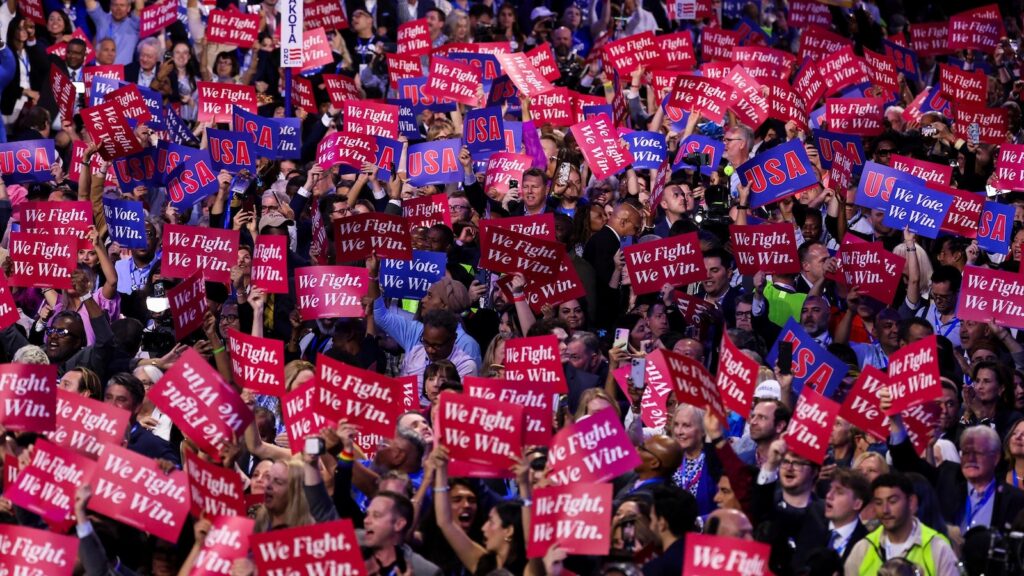Donald Trump jetted to the rolling hills of Asheboro, North Carolina, in late August, for his first outdoor rally since a gunman tried to kill him. The former President’s Boeing 757, known as Trump Force One, performed a showy flyover as thousands of supporters cheered. Wearing a MAGA hat and pumping his fist, he walked onstage to Lee Greenwood’s “God Bless the U.S.A.” and was just forty-five seconds into his remarks when he delivered a shout-out to the state’s Republican nominee for governor and invited him onto the stage. “Mark Robinson!” Trump said. “He’s out there. He’s fighting. He’s fighting. He’s a great one.”
That was then. Robinson is now in trouble, following CNN’s disclosure, last Thursday, of comments posted more than a decade ago on a pornography site called Nude Africa, in which he reportedly made lewd sexual comments, called himself a “black NAZI,” belittled Martin Luther King, Jr., and spoke up for slavery. Trump was in North Carolina again on Saturday, for a rally at the Wilmington airport. But this time Robinson, who is currently the state’s lieutenant governor, wasn’t there. Even as Trump name-checked other candidates on the North Carolina ballot, he avoided all mention of a man he had earlier praised as “Martin Luther King on steroids.”
Robinson was already trailing his Democratic rival, Josh Stein, a Harvard-educated, two-term attorney general who would be North Carolina’s first Jewish governor, before the CNN report came out. Leading Republicans, bracing for the story, had reportedly tried to nudge Robinson out of the race, but a spokesman denied it, and Robinson vowed to persevere against what he called “salacious tabloid lies.” He said that the posts “are not the words of Mark Robinson,” and went on, “Clarence Thomas famously once said he was the victim of a high-tech lynching. Well, it looks like Mark Robinson is, too.” Yet, by Sunday night, most of his campaign staff had quit, leaving him, according to one account, with just two communications aides and a bodyguard. On Monday, the Republican Governors Association announced that it had no plans to spend more money trying to get him elected. Thom Tillis, one of the state’s two Republican senators, put it another way, on X: “We must stay focused on the races we can win.”
As the G.O.P.’s hopes of taking the governorship flatlined, the bigger question was whether Trump could keep North Carolina—and, with it, the Presidency—from slipping out of his grasp. Without the state’s sixteen electoral votes, his path to the White House would narrow significantly, and Democrats have been feeling optimistic, looking to their large ground game, a compelling argument on reproductive rights, and the hope that some of the two hundred and fifty thousand people who voted for Nikki Haley in the state’s primary might look elsewhere or stay home. Monday brought news that Trump will return to North Carolina for the third time in less than three weeks. “It tells me that he’s worried about it,” Christopher A. Cooper, a professor at Western Carolina University and the author of “Anatomy of a Purple State,” told me. “There really is no path for Donald Trump without North Carolina, and this shows he knows it.”
Morgan Jackson, a senior strategist in Stein’s campaign, says that Robinson’s predicament “hurts every Republican on the ballot,” especially with Trump at the top of the ticket. In his view, the pairing could dissuade what he called “Chamber of Commerce, country-club Republicans” from voting. “It is such a fifty-fifty state. Mark Robinson cratering in this race is exactly the kind of thing that could cost Donald Trump fifty thousand votes. That can be the ballgame, right there.” Jackson called the episode another “that has played out in Republican circles across the country, where they grab on to folks whose sole claim to fame is that they yell the loudest and have the most divisive rhetoric.”
The Harris campaign hurried to capitalize on the CNN story, and within twenty-four hours had produced a video advertisement that highlighted Trump’s praise for Robinson, a blue-collar worker with no political experience who declared bankruptcy more than once and saw his house foreclosed upon before first running for office, in 2020. “I’ve been with him a lot, I’ve gotten to know him, and he’s outstanding,” Trump says in the ad. The Democratic National Committee, meanwhile, posted a photo on electronic billboards in North Carolina of the two candidates standing side by side, smiling, in blue suits and red ties. Alongside are quotations of Trump’s comments about Robinson, among them, “We have to cherish Mark.”
In fact, long before the CNN report, Robinson had compiled a lengthy public record of incendiary statements about Jews, Black people, trans people, abortion, and homosexuality. In 2017, on Facebook, he wrote that “Michelle Obama is an anti-American, abortion and gay marriage supporting, liberal leftist elitist and I’ll be glad when he takes his boyfriend and leaves the White House.” In 2018, he posted that the central character in “Black Panther” was created by an “agnostic Jew and put to film by satanic marxist. How can this trash, that was only created to pull the shekels out of your Schvartze pockets, invoke any pride?” Roy Cooper, North Carolina’s twice-elected Democratic governor, who was often mentioned as a possible running mate for Kamala Harris, told reporters that the CNN revelations were hardly surprising. “There’s not a whole lot new here about Mark Robinson’s character,” Cooper, who won in 2016 and 2020, when Trump was also on the ballot, said. (Cooper is limited by law to two consecutive terms.) “Republican leaders and Donald Trump have known who he is and embraced him and supported him from Day One.”
Robinson rocketed into the MAGAsphere in 2018 in his home town of Greensboro, where the city council was considering a proposal to cancel a gun show seven weeks after a nineteen-year-old assailant killed seventeen people at the Marjory Stoneman Douglas High School, in Parkland, Florida. Robinson, who had a job at a furniture company, spoke for just four minutes, but a video of his remarks registered millions of views after a North Carolina congressman posted it on social media. Robinson complained that law-abiding people were being made to suffer because of the actions of one person. “What I want to know is, when are you all going to start standing up for the majority?” he asked. “And here’s who the majority is: I’m the majority.” After a dig at “loonies from the left,” he added that the framers wrote the Second Amendment “for everybody, and I am everybody.”
Within days, Robinson appeared on Fox News, defending gun rights. Soon, he recorded an ad for the N.R.A. and spoke at the organization’s national convention. (He did not then own a gun, he told a reporter. Four years later, he said in a Nash County church sermon that he had purchased AR-15s, “in case the government gets too big for its britches.”) He leaped into the 2020 race for lieutenant governor, a mostly ceremonial position, winning more than twice as many votes as the second-place finisher in the G.O.P. primary. That November, he became North Carolina’s first African American to win the post, slipping in under the radar as voters and journalists focussed on the high-profile races at the top of the ticket.
Robinson’s political views were clear to anyone who chose to look for them. Yet plenty of Republicans either cheered or looked the other way. Robinson declared his interest in running for governor just months after he took office. In 2023, when he made it official, he immediately became the front-runner for the Republican nomination to succeed Cooper. Robinson collected Trump’s endorsement and swamped a pair of more mainstream opponents, including the state treasurer, in the March primary, winning nearly sixty-five per cent of the vote. Invited to speak at the Republican National Convention, he called Trump “the Braveheart of our time.” Along the way, his views on more subjects emerged, including his declaration that the evidence of climate change is “junk science” and that college professors who warn of its consequences are “liars.” He characterized the civil-rights movement as a communist plot to “subvert capitalism” and said that abortion “is about killing the child because you weren’t responsible enough to keep your skirt down.”



